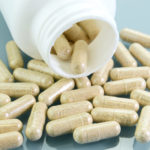A healthy diet could aide in saving your life. By eating balanced, nutritious meals, you are fueling the body with what it needs to keep your cholesterol and sugar levels in check, while fighting off harmful diseases. Instead of thinking about what to take out of your diet, focus your attention on what foods you should be adding in to your daily eating habits. Lean meats, fruits, vegetables, “good” fats, and whole grains are essential to your health, especially heart health.
However, no one has the perfect diet. Life gets in the way sometimes, and you could have a few days in the week in which you didn’t get in enough vitamins. Whether you were too busy or just not in the mood for a salad, your diet can sometimes fall short. That’s OK. If your consistently eating healthy over time, your body will reap the benefits. Since we cannot have the perfect diet, it can be good for you to supplement your diet with vitamins, but talk to your doctor about what you should or can take daily, especially if you think you may have a vitamin deficiency.
For this article, I wanted to share with you some vitamins and supplements that you can take to help with your cardiovascular health. Whether you currently have a heart condition or not, it’s always a good idea to try and keep your heart at its healthiest, since heart disease is the #1 killer in America. The following list are supplements and vitamins that can help keep heart conditions at bay, or keep your heart from further deterioration.
Magnesium – Magnesium helps sodium move throughout the cells in the body, supports relaxation and dilation of vascular arterial walls and stabilizes heart rhythm.
Omega-3 – Omega-3 helps the body balance cholesterol and triglycerides, which is great for people who are at risk for heart disease. Omega-3 is also known to lower blood pressure and slows down the buildup of plaque in the arteries.
Coenzyme Q10 (CoQ10) – Coenzyme Q10 is an antioxidant that fights off free radicals, and manages blood pressure and cholesterol. It also helps with keep the arteries healthy and muscle cells optimally utilizing energy.
L-carnitine – L-carnitine helps transport fat into the mitochondria to be used and burned as fuel by cells.
Arginine – Arginine is an amino acid that helps improve vascular function.
Phospholipids– are necessary to “prime” the HDL particle thus allowing it to sop up cholesterol.
If you’re looking for help with your diet or have concerns about your heart health, Dr. Kordonowy of Internal Medicine, Lipid & Wellness of Fort Myers offers comprehensive dietary consults to his patients. Dr. Kordonowy also offers vitamins and supplements for you to purchase online here. Dr. Kordonowy offers direct patient care membership and concierge services including the unique Inpatient Advocate Service™. To schedule an appointment with Dr. Kordonowy, call 239-362-3005, ext. 200 or click here.
